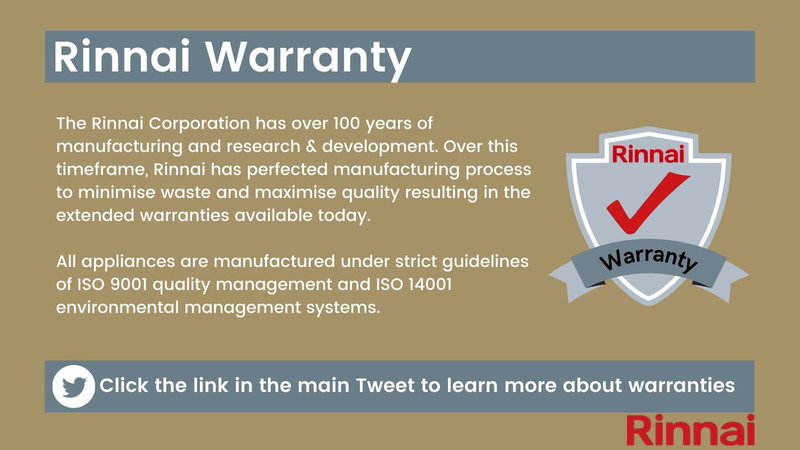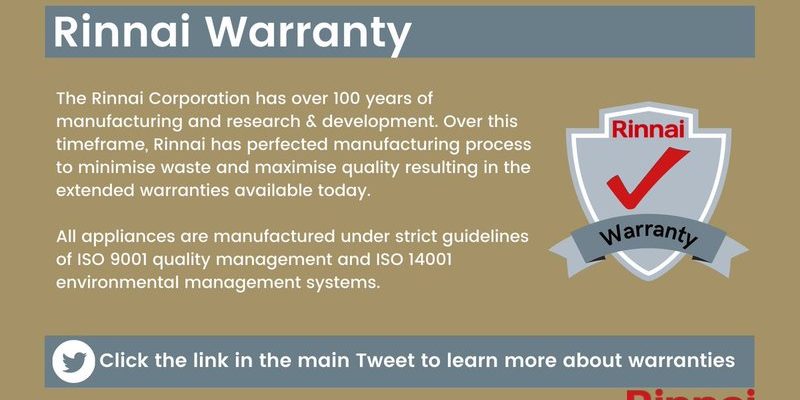
Think of warranty registration as a kind of “fresh start” checklist that connects your heater to the manufacturer’s support system. If you buy a brand-new unit, you register it, and the warranty clock starts ticking for you. But if you get a used one, it’s a little trickier because the warranty typically sticks with the original buyer or the installation date. Let’s break down what that means in practice and how to navigate this situation smartly.
How Warranty Registration Works for Brand-New Rinnai Water Heaters
When you buy a new Rinnai water heater, registering it feels like unlocking a safety net. You usually have to submit a registration form through Rinnai’s website, or sometimes through the installer, to activate your warranty. This process syncs your purchase with the official records, making any future troubleshooting or repairs smoother.
Here’s the thing — Rinnai warranties generally start from the original installation date, not the purchase date, so accurate registration helps confirm that date. Plus, registration can sometimes speed up service requests or replacements because Rinnai knows exactly when and where that unit was put into service.
The key takeaway: For new units, registering right away is always a good move. It’s usually quick and gives you peace of mind that Rinnai’s got your back if anything goes wrong.
What Happens to the Warranty When Buying a Used Rinnai Water Heater?
So, you bought a used Rinnai water heater—great! But here’s the catch: warranties aren’t automatically transferable like handing over a user manual. Rinnai’s warranty terms usually tie the coverage to the original purchaser and installation date. That means if you try to register a used heater, Rinnai might say, “Sorry, this warranty is already active for someone else, or it expired.”
Imagine it like a gym membership—you can’t just give your membership card to a new person, right? The system needs to know who’s responsible and when it all started. Similarly, Rinnai tracks warranty coverage from the original owner to prevent warranty fraud and confusion.
That said, some Rinnai warranties may allow transfer under certain circumstances, but it’s not common or guaranteed. It often requires proof of purchase and installation by a licensed contractor, and even then, the balance of the warranty depends on the age of the unit.
How to Check If a Used Rinnai Water Heater’s Warranty Is Still Active
Here’s a practical step: before you count on warranty coverage for a used heater, you want to check its current status. You can do this by contacting Rinnai support directly or using their website services if available. You’ll need details like the unit’s serial number and model code.
When you call or email Rinnai, ask them to verify:
- The original installation date
- The warranty expiration date
- Whether the warranty is transferable to you
Knowing this info upfront saves you from unpleasant surprises later. If the warranty has expired or isn’t transferable, at least you’ll understand what parts or repairs you might need to cover yourself.
Steps to Take If You Can’t Register a Used Rinnai Water Heater
Okay, so you found out that you *can’t* register your used Rinnai water heater for a new warranty. What next? Honestly, it’s not the end of the world, but it does mean you should be prepared for a little more hands-on maintenance.
First, keep detailed records of your purchase and installation, including any inspections or maintenance you perform. If you ever need to troubleshoot or repair, documentation helps you or your plumber figure out what’s going on.
Second, consider the option of buying an extended warranty or service plan from third parties, if available. Some companies offer coverage that kicks in when the manufacturer’s warranty ends—or wasn’t available in the first place.
Third, brushing up on basic troubleshooting and maintenance routines can save you headaches. For example, knowing how to check your water heater’s remote control sync, reset the unit properly, or change batteries on any connected devices can keep things running smoothly.
Why Maintenance and Troubleshooting Matter More Without Warranty
Without an active warranty cover, your water heater becomes like a car without roadside assistance. You’re responsible for spotting heating issues, error codes, or pesky resets that might crop up. Rinnai units usually come with built-in diagnostics that display error codes on the remote or unit panel, which helps with troubleshooting.
Routine maintenance includes flushing the heater to remove mineral buildup, checking for leaks, and ensuring that the system’s battery backup (if applicable) is working. If your remote isn’t syncing properly or you need to reset the unit after a power outage, having a basic idea of those steps can save you money and stress.
Alternatives to Registering a Used Rinnai Water Heater for Warranty
If warranty registration isn’t possible, you might wonder if there’s a workaround. One alternative is to purchase a brand-new Rinnai water heater if budget allows, ensuring the full warranty experience. Another is to look for certified refurbished units sold directly by Rinnai or authorized dealers, who often include warranty coverage.
Some people consider universal water heater remotes or controls that can pair with multiple models when the original remote is lost or broken. That’s useful, but remember it won’t affect warranty status—it’s just a convenience tool.
Finally, if you’re comfortable with basic plumbing and troubleshooting, investing in a good-quality diagnostic tool or app for water heaters might help you keep an eye on system health, reducing the risk of unexpected breakdowns.
Why It Pays to Understand Your Rinnai Water Heater’s Warranty Status
Let me be real—warranties can feel like legalese that nobody wants to deal with. But with something as essential as your water heater, knowing whether you’re covered can save big headaches (and dollars) down the line.
You might think, “Well, I can just fix it myself or replace parts as needed.” And you could. But in the case of a Rinnai water heater, some repairs need specialist knowledge or parts from the manufacturer, and a valid warranty can make that process much smoother and cheaper.
Also, if you ever decide to sell your house or the water heater, having a registered warranty adds value and peace of mind for the next buyer. It’s a bit like having a car with a clean service history—it just makes everything easier and more trustworthy.
Final Thoughts on Registering Used Rinnai Water Heaters
So, can you register used Rinnai water heaters for warranty? Usually, no—not in the same way as a new unit. The warranty generally stays linked to the original buyer and installation date, and transferring it can be tricky or not allowed.
But knowing this upfront means you can make smarter choices: checking warranty status before buying, considering alternative coverage options, or leaning into good maintenance and troubleshooting yourself. After all, water heaters are workhorses in your home, and understanding their warranty and care ensures they keep running without surprise cold showers.
If you’re ever in doubt, don’t hesitate to reach out directly to Rinnai customer service—they can provide the most accurate info based on your unit’s serial number and history. And whatever your situation, staying informed is the best way to keep your water heater—and your peace of mind—flowing smoothly.
